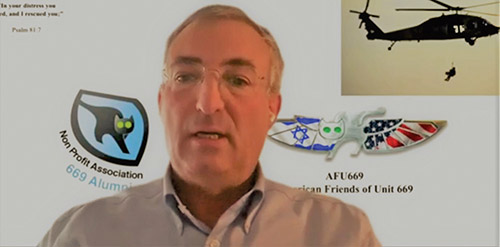

On May 20, the Consulate General of Israel in New York and Unit 669 of the Israel Air Force’s Airborne Combat, Search and Rescue squad hosted a virtual discussion, “Combating the Coronavirus in Israel and New York.” The event was moderated by Tal Heinrich, an Israeli journalist and anchor.
Ambassador Dani Dayan, consul general of Israel in New York, shared, “In Israel, we have 279 deceased persons since the beginning of the pandemic. In New York, we had three times that number in one day. There are many explanations. Some are related to decisions by the decision makers and some by external factors. For example, Israel has one point of entry in contrast to the United States and Europe, which have many.”
Heinrich noted, “You may have heard that coronavirus has been compared to a war against an invisible enemy. We will break down the response within Israel and in the United States, more specifically in New York, with two high level medical experts who both have IDF military backgrounds.”
Professor Ari Shamiss, MD, is CEO of Assuta Medical Center in Israel, former IAF medical commander, and chairman of 669’s alumni organization’s board of trustees. He described the coronavirus situation in Israel, which has unfortunately changed since the presentation. At the time, there were 16,500 patients and 270 deaths, with 30 patients in severe condition and another 40 moderate.
He stated, “We came to learn this new virus and now we are much smarter and know how to treat our patients,” adding, “When Israel opens up [to the world], they are expecting a second wave, which I think will be very shallow. The problem will be the third wave, an overlap between influenza and corona during the autumn; this is much more worrisome as the hospitals will need to come up with capacity. Hopefully, we are coming with a vaccination. Maybe this is something that will be available by October and not a year from now.
He continued, “We have had some children in Israel with the Kawasaki-like disease. This is worrisome, but in Israel the mortality is close to zero. We know how to treat Kawasaki.”
Dr. Shamiss stated, “The two best things that Israel did was closing the borders, specifically the airport, and the complete lockdown of the State of Israel.”
David Ben-Eli, MD, medical director of New York City’s Fire Department (FDNY), attending emergency medical physician at Northwell Health, AFU669 board member and a former doctor in Unit 669, commented, “I think we all can be somewhat optimistic; we see the numbers of new cases and of mortality are dropping [and] the number of admitted COVID patients is also dropping. I see no reason why this trend will not continue at this point. I think we can be cautiously optimistic that we are going in the right direction and that the measures which were taken have actually helped and are helping to curb this current wave.”
“From the hospital, emergency rooms, ICU and EMS perspective,” he continued, “it has been a very difficult and very trying time. These days it is a relief for everyone that we are going back to seeing patients with other problems; we are moving in the right direction.”
Dr. Ben-Eli noted that initially hospitals in New York were seeing patients with other symptoms. “Regular patients were coming in and we figured out very quickly that all of the patients we saw probably had COVID. Later on, we only saw patients with the virus, and now we are starting again to see patients that are coming in with other complaints.”
Dr. Ben-Eli concluded, “The clapping and cheering, which is still continuing in New York City, is amazing. It is phenomenal to see. I am surprised that it is still happening. Every day at 7 p.m. people stop for a few minutes to clap and cheer to show gratitude to health care workers.”
The event ended moments before 7 p.m. to allow the audience to participate.
By Judy Berger
�











